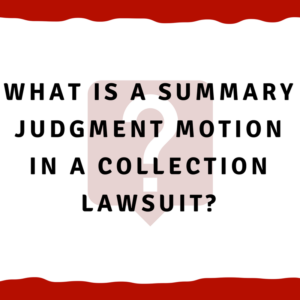What is a summary judgment motion in a collection lawsuit?
 Often if you have been sued in Circuit Court in Alabama you will face a “motion for summary judgment” so let’s talk about that for a moment.
Often if you have been sued in Circuit Court in Alabama you will face a “motion for summary judgment” so let’s talk about that for a moment.
What is a motion for summary judgment?
A “motion” is simply a written request asking the court to do something.
“Summary judgment” is asking the court to rule — to enter judgment in favor of the debt collector. The basis is that no reasonable judge or jury could possibly rule in favor of the consumer. This is to end the case quickly — think of it as the “knockout blow” instead of having a trial.
What happens if the debt collector puts forward good evidence and legal arguments?
So the collector gives evidence and arguments to the court in a written format. The debt collector must follow the Alabama Rules of Civil Procedure, specifically Rule 56.
If the collector does this correctly, then the burden of proof shifts to you to show the court that there are factual disputes that must be solved at trial. And/or that the law does not support what the collector is arguing.
And the court does not tell you this and then you respond. You have to respond and point out the defects in the motion for summary judgment — I have fought many of these and I can’t remember ever seeing one that was done properly so you’ll need to respond….
How do I respond to a motion for summary judgment?
Here’s where it can get challenging if you are representing yourself in Alabama. You have to not only follow the substantive law but also the rules of civil procedure. You have to study Rule 56 of the Alabama Rules of Civil Procedure to know the “form” of how and when to respond.
When and how and where do you file your opposition to the motion for summary judgment? If you get this wrong, you lose and judgment will be entered against you.
Here are a few guidelines and you can also find a blog post on summary judgment motions that goes into some detail on this subject:
- You file your response with the clerk of the court and often you provide a courtesy copy to the judge
- You need to respond to both the facts and the law — ignore these at your peril
- The judge may set a “briefing schedule” but if not then the general rule is you respond 2 business days before the hearing date
- Often the judge will set the motion for a hearing so you can provide oral argument so you must be prepared for this.
- If you have a
You need to know the law in Alabama (other state’s laws are usually not helpful) on a debt buyer suing you and proving its case. This is what you might think of as the “substance” of your argument.
So you need the “form” and the “substance” or you will lose.
What happens at the summary judgment hearing in the courtroom?
The debt collector will make its arguments and then you respond. The judge may or may not ask questions to get clarification.
Sometimes the judge will rule right away on who wins and who loses but normally this happens days or weeks after the hearing to give the judge time to study the arguments made in writing and at the hearing.
Do I still get my trial if the judge grants the motion for summary judgment against me?
If there is judgment entered against you then there is no trial. There is no “day in court” because the summary judgment is your day in court. The case is over.
The next step is for the collector to start executing on the judgment. This can be:
- Garnishment of paychecks
- Garnishment of bank accounts
- Liens put on your property
- Selling your vehicles
- Selling your house
So what do I need to do if I face one of these summary judgment motions?
The biggest danger in circuit court is facing this summary judgment because normally consumers (represented and un-represented) often don’t follow the rules in responding to the motion. So make sure you follow the rules and appreciate the danger facing you so you can make your best defense possible.
If you act as your own lawyer, then make sure you are prepared for the legal/substantive arguments as well as the procedural/form arguments so you will not be surprised or caught off guard.
If you have questions about your options when sued in Alabama (you have as many as five), or about summary judgment, please feel free to get in touch with us by calling us at 205-879-2447 or contacting us through our website and we will get right back to you to set up a call or meeting.
John G. Watts
Watts & Herring, LLC
Birmingham and Madison Offices in Alabama
We represent consumers from all parts of Alabama